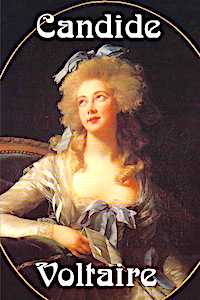

Tao Te Ching

Candide
By Voltaire, François-Marie Arouet
Written during the height of the Seven Years’ War and after a devastating earthquake, a time of mindless violence and extensive, cruel persecutions, Candide personifies naïveté. Confused by the rampant abuses of power he encounters, his experiences expose the evil of fanatical religious belief and the regularity of power corrupting leaders. He spares none of the local religions—Christian, Jewish, Muslim—in his view of faith as an excuse for cruelty.
Voltaire explores the question of how there can be so much evil and suffering in a world ruled over by a benevolent god. He sees our attempts to explain this away with religious or philosophical views as an enabling and excusing of cruelty, rather than a way of lessening it. Candide grows in this paradoxical awareness with an understanding of the human desire for order in a chaotic world and our illusory attempts to create this order with unrealistic conceptualizations. As perhaps an example of the possibility of seeing through illusions, Candide, after becoming intoxicated by Cunegonde's beauty and pursuing her his whole life, when he finally finds her, she is ugly and shrewish.
Voltaire concludes his exploration with the conclusion that theoretical constructs only tend to make things worse and the recommendation of focusing on the day-to-day details; "we must cultivate our garden."
Now considered one of the most subversive and influential books ever written, it was quickly banned after its secret publication with a pseudonym. Immediately condemned by both religious and political leaders as "contrary to religion and morals," it was quickly banned by governments and prohibited by the Catholic Church. These rejections lasted into the 20th century and it was banned from being imported into Harvard University in 1929.
A precursor to Huxley's Brave New World and Orwell's Nineteen Eighty-Four, Candide became a major influence on writers like Samuel Beckett, Joseph Heller, Thomas Pynchon, Kurt Vonnegut, and Terry Southern.
Quotes from Candide
“'That's well said,' replied Candide, 'but we must cultivate our garden.'”
Chapters:
Comments: Click to comment
“A million drilled assassins go from one end of Europe to the other murdering and robbing with discipline in order to earn their bread, because there is no more honest occupation”
Chapters:
Comments: Click to comment
“Do you think that men have always massacred each other as they do today? Have they always been liars, cheats, traitors, brigands, weak, flighty, cowardly, envious, gluttonous, drunken, grasping and vicious, bloody, backbiting, debauched, fanatical, hypocritical and stupid?”
Chapters:
Comments: Click to comment
“expelled without a penny and obliged to continue the abominable occupation which to you men seems so amusing and which to us in nothing but an abyss of misery... Ah! sir, if you could imagine what it is to be forced to caress impartially an old tradesman, a lawyer, a monk, a gondolier, an abbé; to be exposed to every insult and outrage; to be reduced often to borrow a petticoat in order to go and find some disgusting man who will lift it...”
Chapters:
Comments: Click to comment
“France... I have traversed several provinces. In some half the inhabitants are crazy, in others they are too artful, in some they are usually quite gentle and stupid, and in others they think they are clever, in all of them the chief occupation is making love, the second sandal-mongering, and the third talking nonsense... Paris... is a chaos, a throng where everybody hunts for pleasure and hardly anybody finds it”
Chapters:
Comments: Click to comment
“I think that everything goes awry with us, that nobody knows his office nor what he is doing, nor what he ought to do. Almost all of their time is passed in senseless quarrels: Jansenists with Molinists, lawyers with churchmen, men of letters with men of letters, courtiers with courtiers, financiers with the people, wives with husbands, relatives with relatives—it's an eternal war.”
Chapters:
Comments: Click to comment
“in her arms I enjoyed the delights of Paradise which have produced the tortures of Hell by which you see I am devoured”
Chapters:
Comments: Click to comment
“Let us work without theorizing, 'tis the only way to make life endurable. Man was not born for idleness and work keeps at bay three great evils: boredom, vice, and need.”
Chapters:
Comments: Click to comment
“You can easily guess that when a man has spent a month in Eldorado he cares to see nothing else in the world but Madame Cunegonde.”
Chapters:
Comments: Click to comment
Comments (0)